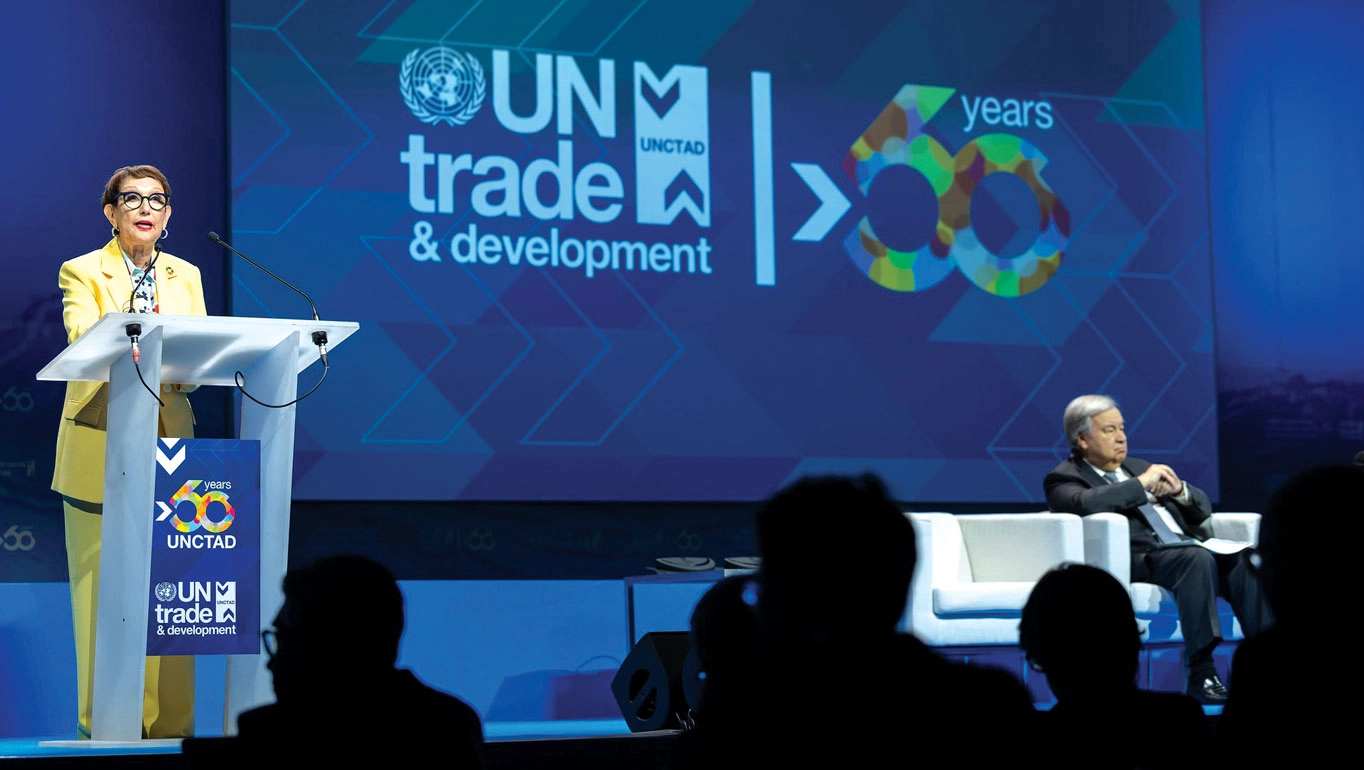In a global economy marked by trade disruptions, growing inequality, and geopolitical tensions, Rebeca Grynspan has led UN Trade and Development (UNCTAD) since 2021 with a pragmatic, balanced, evidence-based approach, while modernizing the institution’s strategy to development.
Ms. Grynspan’s role at UN Trade and Development builds on a career rooted in public service and resilience. Born in rural Costa Rica in 1955, she became the first woman and first Central American to lead this UN body. Her background in economics and experience as Costa Rica’s Vice President, following key ministerial roles, laid the foundation for her global leadership.
In government, she championed social development, poverty reduction, and gender equality – causes central to her current work. Her subsequent roles, including as Director of UNDP’s Latin America Bureau, UNDP Associate Administrator and Secretary-General of the Ibero-American General Secretariat, prepared her to address today’s complex global issues, particularly the divide between developed and developing nations.
In a recent interview, she stressed the importance of ensuring developing countries have a voice where it counts: “Our goal is to make sure developing countries have a real voice where it matters most. With 195 member states, UNCTAD reflects their perspectives and uniquely builds bridges of understanding. Though the Sustainable Development Goals are off track, we still have time to make them a reality—they are our last, best chance for global solidarity.”
Her tenure at UN Trade and Development began amid the COVID-19 pandemic, a period that fundamentally altered global dynamics. As the world continued to grapple with these changes, the war in Ukraine, the cost of living crisis and the recent war in the Middle East introduced new geopolitical challenges. Despite these disruptions, Ms. Grynspan remained steadfast, taking on major responsibilities.
One of her key roles was leading the negotiations on behalf of UN Secretary-General António Guterres for the Memorandum of Understanding between the UN and the Russian Federation, which aimed to ensure unimpeded access for Russian food and fertilizer exports to global markets. This MoU, one of the two Agreements signed in Istanbul in July 2022, along with the Black Sea Initiative, was crucial in facilitating the export of Ukrainian and Russian food and fertilizers, helping to reduce and stabilize global food prices. “This is an agreement for the world,” Mr. Guterres said at the signing ceremony.
Ms. Grynspan negotiated these agreements while facing significant personal challenges, showcasing both her diplomatic skill and resilience under pressure.
The evolving nature of globalization – now increasingly questioned as it was once understood – is central to her development vision. Ms. Grynspan advocates for an inclusive globalization, one that enables developing countries to transform their productive structures, add value, move beyond commodity dependence and fully benefit from opportunities in trade, investment, technology and the digital transformation, all in pursuit of achieving the SDGs.
Global governance is also under scrutiny as current structures struggle to address crises. Ms. Grynspan calls for a more inclusive international order, one that empowers developing nations. “We are navigating through a storm of change, with inequality worsening in real-time. No country can face these challenges alone; we need international institutions that can respond swiftly and effectively,” she stated.
Ms. Grynspan emphasizes the need to approach the financing crisis as a development crisis. “Many countries face impossible choices,” she argues, noting that over 3.3 billion people live in nations spending more on debt service than on health or education. “People suffer, even if markets don’t,” she warns, recalling her experience as part of the team that successfully renegotiated Costa Rica’s debt with the IMF and World Bank during the 1980s debt crisis.
She advocates for reforming the international financial architecture, urging greater representation for developing countries in institutions like the IMF and World Bank. Ms. Grynspan emphasizes that inclusivity is crucial to prevent institutions like these from perpetuating the inequalities they were meant to address.
In her three years in office, Ms. Grynspan has faced significant challenges. “We’ve dealt with global tensions to the pandemic, but a major hurdle is ensuring our trade and development voice is heard in global discussions. This requires listening to member states, partnering effectively within the UN, and embedding our perspective in every relevant forum.” Her commitment underscores her vision for reforming UN Trade and Development to meet today’s needs. “Trade and investment are crucial for sustainable development, and we’re taking concrete steps to drive progress and shape a more inclusive, resilient global economy. If we are serious about achieving the SDGs and ensuring no one is left behind, this work is essential.”



